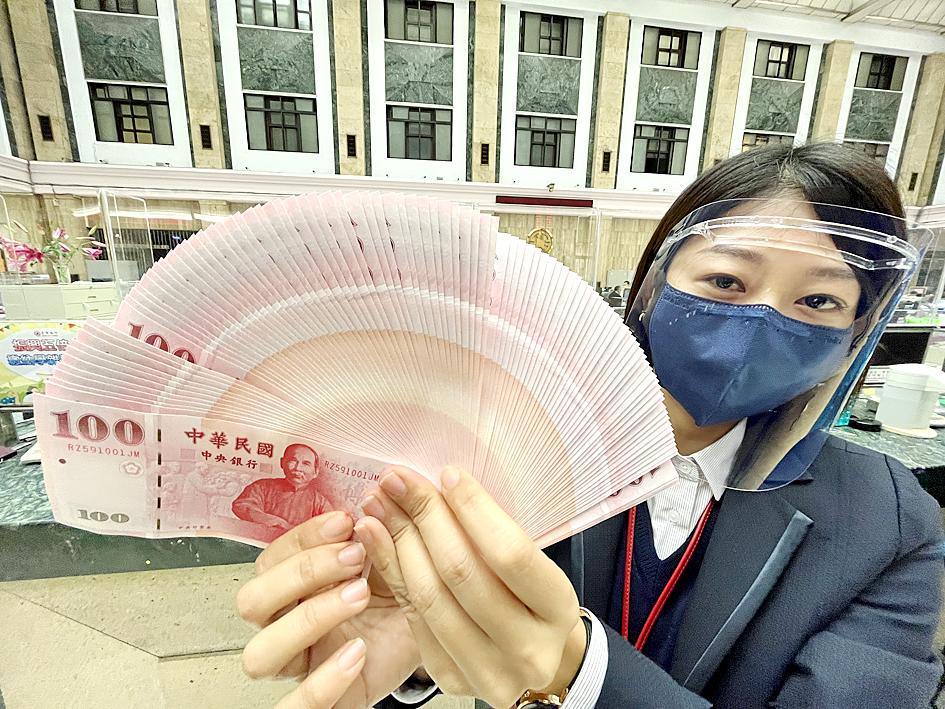The central bank yesterday pledged to continue “enhanced engagement” with the US after Washington on Friday placed Taipei on a list of countries being monitored for currency manipulation.
The bank said it has conducted several rounds of talks with US authorities on bilateral trade and currency since April last year, and clearly expressed its stance on the issues.
Citing the US Department of the Treasury’s latest semi-annual currency report covering last year, the bank said Washington agreed that the “productive discussions have helped develop a common understanding of the policy issues related to the Treasury’s concerns about Taiwan’s currency practices.”

Photo: CNA
“Over the next year, the central bank will continue its enhanced engagement with the US on currency issues,” it said, but did not comment on Taiwan’s performance regarding specific thresholds cited in the report.
The report placed Taiwan and Vietnam on a list of countries being monitored for currency manipulation.
The three thresholds the US uses to determine currency manipulation are: a bilateral goods and service trade surplus of at least US$15 billion, a current account surplus equivalent to 3 percent of GDP, and persistent, one-sided foreign-exchange interventions amounting to at least 2 percent of GDP.
According to the report, Taiwan’s bilateral trade surplus with the US and current account surplus were above the manipulation thresholds over the reporting period of the four quarters through December last year.
Taiwan recorded a US$40 billion bilateral goods trade surplus with the US last year, up from US$28 billion in 2020, and had a current account surplus of US$115 billion (14.8 percent of GDP), the report said.
Taiwan was not cited for excessive foreign-exchange interventions last year, when the New Taiwan dollar appreciated for a third straight year against the US dollar, by 2.95 percent.
Analysts said that the central bank intervened during most foreign-exchange trading sessions last year to limit the NT dollar’s gains, but the bank never admitted to it, saying only that it had a responsibility to combat volatility and maintain market stability.
This year, as the NT dollar has weakened against the greenback because of US Federal Reserve rate hikes to fight inflation, Taiwan’s central bank has stepped in to slow down the local currency’s depreciation, especially in March and April.

Taiwanese can file complaints with the Tourism Administration to report travel agencies if their activities caused termination of a person’s citizenship, Mainland Affairs Council Minister Chiu Chui-cheng (邱垂正) said yesterday, after a podcaster highlighted a case in which a person’s citizenship was canceled for receiving a single-use Chinese passport to enter Russia. The council is aware of incidents in which people who signed up through Chinese travel agencies for tours of Russia were told they could obtain Russian visas and fast-track border clearance, Chiu told reporters on the sidelines of an event in Taipei. However, the travel agencies actually applied

Japanese footwear brand Onitsuka Tiger today issued a public apology and said it has suspended an employee amid allegations that the staff member discriminated against a Vietnamese customer at its Taipei 101 store. Posting on the social media platform Threads yesterday, a user said that an employee at the store said that “those shoes are very expensive” when her friend, who is a migrant worker from Vietnam, asked for assistance. The employee then ignored her until she asked again, to which she replied: "We don't have a size 37." The post had amassed nearly 26,000 likes and 916 comments as of this

New measures aimed at making Taiwan more attractive to foreign professionals came into effect this month, the National Development Council said yesterday. Among the changes, international students at Taiwanese universities would be able to work in Taiwan without a work permit in the two years after they graduate, explainer materials provided by the council said. In addition, foreign nationals who graduated from one of the world’s top 200 universities within the past five years can also apply for a two-year open work permit. Previously, those graduates would have needed to apply for a work permit using point-based criteria or have a Taiwanese company

The Shilin District Prosecutors’ Office yesterday indicted two Taiwanese and issued a wanted notice for Pete Liu (劉作虎), founder of Shenzhen-based smartphone manufacturer OnePlus Technology Co (萬普拉斯科技), for allegedly contravening the Act Governing Relations Between the People of the Taiwan Area and the Mainland Area (臺灣地區與大陸地區人民關係條例) by poaching 70 engineers in Taiwan. Liu allegedly traveled to Taiwan at the end of 2014 and met with a Taiwanese man surnamed Lin (林) to discuss establishing a mobile software research and development (R&D) team in Taiwan, prosecutors said. Without approval from the government, Lin, following Liu’s instructions, recruited more than 70 software